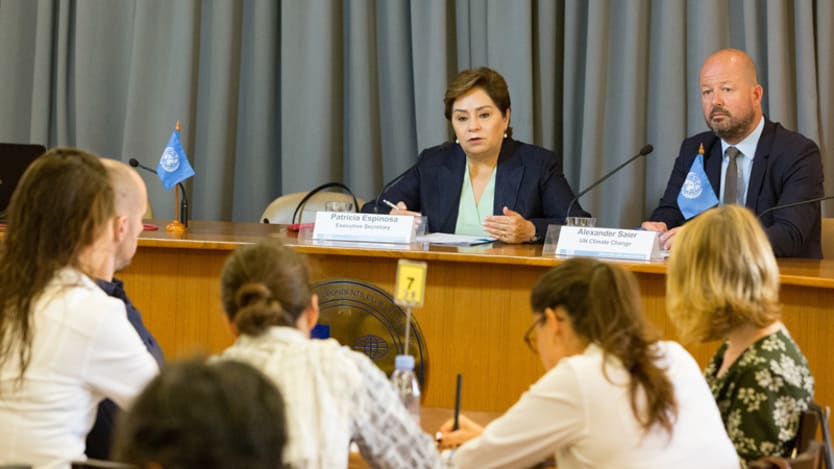
BANGKOK — Proposed text from the United States, Japan, and Australia could water down climate finance guidelines, and casts doubt that this week’s Bangkok negotiations will deliver the clear climate rules United Nations leaders have been calling for.
Environment and energy delegates from around the world are gathered in the Thai capital to hash out the Paris “rulebook” — the framework of operating procedures for how countries should fulfil their obligations under the landmark Paris Agreement on climate change. There is a sense of urgency at the U.N. conference center, with improved guidelines expected in just three months, when Poland hosts the 24th Conference of the Parties. United Nations Framework Convention on Climate Change Executive Secretary Patricia Espinosa has repeatedly warned of the chaos delegations will face in the Polish city of Katowice if the Bangkok negotiations stall.
More on the Bangkok climate talks:
► Climate negotiators grapple over balanced Paris 'rulebook' in Bangkok
► In Bangkok, climate campaigners warn against the private sector 'silver bullet'
But recently published text from several developed countries serves to muddy the rules rather than clarify them, according to climate campaigners. The proposed text outlines the U.S., Japan, and Australia’s stance on article 9.7 of the Paris accord, which refers to accounting and is meant to establish rules about how developed countries report what finance they provide to developing countries.
The proposal, submitted to UNFCCC on Sept. 4, presents a flexible approach in favor of dropping climate finance rules and “does not create any meaningful rules on how climate finance is accounted for, and instead it essentially says ‘countries should report what they want,’” Brandon Wu, director of policy and campaigns for ActionAid USA, told Devex.
Implicit in the proposal is the idea that countries can report items such as commercial loans as climate finance — a huge sticking point for climate campaigners from the “global south” demanding clear financial and technical packages to help them cope with future extreme weather-related events.
For climate justice groups, the latest draft text demonstrates industrialized countries backtracking on their commitments, as the commercial loans example would allow developed countries to report climate financing, despite the fact that developing countries would be expected to repay them with interest.
“This would completely let rich countries off the hook and deprive developing countries of real money for real action,” Wu said.
Under the UNFCCC principles, financing for climate change is “supposed to be additional, it’s supposed to be over and above official development assistance,” said Mithika Mwedna, co-founder and secretary general of the Pan African Climate Justice Alliance. “But the money is not, it’s coming as loans, equity, and blended finance, and this is really frustrating.”
To date, almost all climate finance being provided is just “rebadged aid,” said Julie-Anne Richards, climate expert and co-author of new report “Not a Silver Bullet.” “So developed countries have just taken the ODA and called it something else.”
ActionAid and other civil society organizations following finance aspects of the Paris Agreement believe countries should report climate finance on a grant-equivalent basis, where nonconcessional loans would not be reported at all.
But developed countries, “particularly the U.S., supported by the [European Union] and Japan, are completely resisting to make any progress on the modalities of how [finance] information will be provided,” according to ActionAid’s International Climate Policy Manager Harjeet Singh. Instead, they’re playing with language and assuming their submissions will be accepted, he said.
“[Developing countries] need to know how money is coming, how much money is coming, who is contributing, and how it's going to reach to developing countries so that their plans are in place — because [the] Paris Agreement was all about putting climate actions together,” Singh said.




